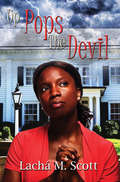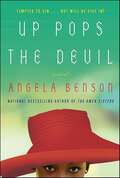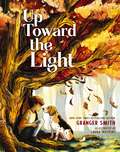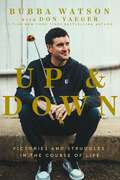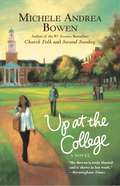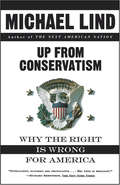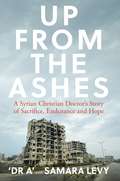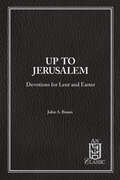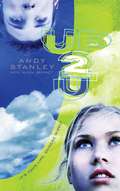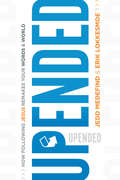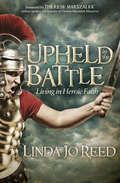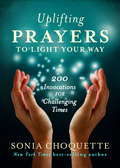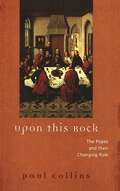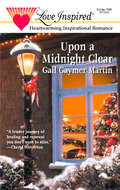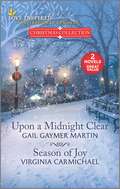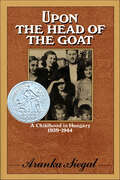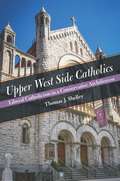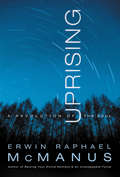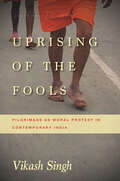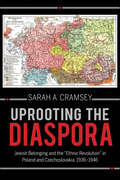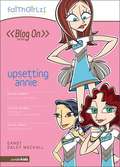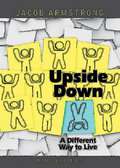- Table View
- List View
Up Pops the Devil
by Lacha M ScottNewlywed Serena Jackson has finally married the man of her dreams. Life is great, broken relationships are on the mend, and serving in ministry is better than ever before. Serena believes that even greater things are on the horizon for her, until her life makes a detour down an unexpected road. Her dream of having the perfect life with what God has blessed her with soon becomes a blur.Everything Serena holds dear to her heart is being snatched away from her. Silenced by her pain and betrayed by the love of her life, Serena's own life-altering decisions will rock her family to the core. She questions whether the God she's served most of her life is really for her. Was everything she worked for all in vain?
Up Pops the Devil: A Novel
by Angela BensonTwo hard years in prison have changed Wilford "Preacher" Winters for the better. He did his time, now he's going to "do the right thing." But the women in his life have other ideas.Tanya, the sleek and sexy mother of his two kids, is much too comfortable with her pearls-and-Porsche lifestyle, and she'll do whatever it takes to maintain it...His sister, Loretta, kept "the business" running smoothly while Preacher was inside, and she can't believe he'd trade Easy Street bling for a nickel-and-dime dead-end job...His one-time girlfriend Serena, now married to his main man Barnard, is hiding a secret—and if past sins come to light, they'll ruin several lives and a very new, very precious friendship between Preacher and Barnard's beautiful-inside-and-out sister, Natalie.With his world about to explode all around him, Preacher's going to need every ounce of his new-found faith to remain strong. Because it takes a lot to become a new man, sometimes even a miracle.
Up Toward the Light
by Granger SmithThrough a simple conversation between a boy and a tree, country-music star Granger Smith shares an incredibly powerful and deeply moving story filled with life lessons on loss, grief, and the strength gained in finding the light and the will to move forward with joy and purpose.In this wonder-filled and inspiring story of surprising loss but found strength, a boy encounters a red oak who shares forest wisdom about the rich soil and the nourishing sun, pointing the boy toward a simple truth about moving on: we must grow toward the light. With breathtaking artwork from Laura Watkins, this picture bookis for ages 4 to 8;is a message of hope and strength that is passed through generations;shares the value of pain, grief, and reaching out of the darkness toward the light; andis perfect for fans of The Boy, the Mole, the Fox and the Horse; The Velveteen Rabbit; The Invisible String or other beloved stories that teach life lessons through simple but profound moments.As you settle into the soothing nature of Granger's storytelling, let this meaningful interaction between a boy and a tree guide you toward the purpose and goodness of life.
Up and Down: Victories and Struggles in the Course of Life
by Bubba WatsonHe was a small-town boy who burst onto the international golf scene with a dramatic hook shot from deep in the woods to win the Masters— before the game he loved almost killed him. Opening up about the toll that chasing and achieving his dream of being a champion golfer took on his mental health, Bubba Watson shares his powerful story of the breaking point that gave him clarity. Bubba Watson is known as the big-hitting left-handed golfer who plays with the pink driver—the small-town kid who grew up as a child golf prodigy before going on to win two Masters Tournaments, competing in the Olympics, and rising to be the number two golfer in the world. But every dream comes with a price. Feeling that he was never good enough, Bubba began to let the constant criticism from fans and commentators haunt his thoughts. Success in the game he loved was killing him.In Up and Down, Bubba opens up about his debilitating anxiety attacks, the death of his father and namesake, adopting his children, and how reaching a breaking point professionally and personally drew him closer to his family and God. Golf is what Bubba Watson does, but it is not who he is. Through his story, you&’ll learn how Bubba: Overcame his anxiety and feelings of inadequacy Found his true identity not in the standards of the world, but in the God who already knows he is enough Learned to trust God with his gifts, family, and biggest dreams Became the husband, father, friend, and mentor he was called to be Life, like golf, is filled with ups and downs. Up and Down is the inspiring story of an imperfect man striving to become the best person he can be—wherever the course may take him.
Up at the College
by Michele Andrea BowenUP AT THE COLLEGE is the second novel in a three-part series about the lives of contemporary African American church folk who live in Durham, North Carolina. Yvonne Fountain Copeland's world turns upside down when her husband of fifteen years decides to leave her because their marriage was getting boring. Yvonne returns to her hometown of Durham, North Carolina, to try and pick up the pieces of her life.Coach Curtis Parker seems to have it all: money, a successful coaching career at Evangeline T. Marshall University, plus he's great-looking, single and childless. Yvonne and Curtis are both spinning around in circles trying to attain happiness without God's help and what began as a series of "why me's" evolves into an extraordinary journey consisting of victory, faith, joy and love.
Up from Conservatism
by Michael LindFor nearly a decade, Michael Lind worked closely as a writer and editor with the intellectual leaders of American conservatism. Slowly, he came to believe that the many prominent intellectuals he worked with were not the leaders of the conservative movement but the followers and apologists for an increasingly divisive and reactionary political strategy orchestrated by the Republican party. Lind's disillusionment led to a very public break with his former colleagues on the right, as he attacked the Reverend Pat Robertson for using anti-Semitic sources in his writings. In Up From Conservatism, this former rising star of the right reveals what he believes to be the disturbing truth about the hidden economic agenda of the conservative elite. The Republican capture of the U. S. Congress in 1994 did not represent the conversion of the American public to conservative ideology. Rather, it marked the success of the thirty-year-old "southern strategy" begun by Barry Goldwater and Richard Nixon. From the Civil War to the civil rights revolution, the southern elite combined a low-wage, low-tax strategy for economic development with a politics of demagogy based on race-baiting and Bible-thumping. Now, Lind maintains, the economic elite that controls the Republican party is following a similar strategy on a national scale, using their power to shift the tax burden from the rich to the middle class while redistributing wealth upward. To divert attention from their favoritism toward the rich, conservatives play up the "culture war," channeling popular anger about falling real wages and living standards away from Wall Street and focusing it instead on the black poor and nonwhite immigrants. The United States, Lind concludes, could use a genuine "one-nation" conservatism that seeks to promote the interests of the middle class and the poor as well as the rich. But today's elitist conservatism poses a clear and present danger to the American middle class and the American republic.
Up from the Ashes: A Syrian Christian Doctor's Story of Sacrifice, Endurance And Hope
by Samara Levy Dr. AIn one of the most brutal wars of the twenty-first century, millions of Syrians fled for a safer life elsewhere. Dr A was one of the few medical doctors that stayed. This is the story of a penniless boy, raised in poor family, whose only hope of pursuing his life's dream of becoming a doctor, was to study hard, be the top grade student at his school, to win a scholarship to study free at medical school.Driven by his Christian faith, Dr A risked his own safety, and that of his family, to care for innocent lives caught in the epicentre of a war zone through the most aggressive years of the Syrian war. As his world exploded and collapsed around him, he lost his home and hospital, while his friends, colleagues, relatives and neighbours were either kidnapped or killed, or fled from the country. Yet he remained uncompromising in his commitment to serve his people, through these near-apocalyptic events. After years of service as a doctor, when his turn came for military conscription, Dr A was forced to make one of his toughest decisions yet. To avoid being conscripted, he opted for nearly four years of isolation to evade being found, and was unable to use his skills and experience as a doctor to help those in need. It was there, at his most vulnerable, that Dr A was humbled to a deeper faith rooted in the love and service of Jesus. In spite of his withdrawal from obvious society, he managed to continue supporting his people working through a small and trusted team. Rejoining society after these life-changing years, he emerged with renewed commitment to rebuild the broken world and community he was part of, both challenging and inspiring those around him to pick up the pieces of their lives.Up From the Ashes is a gripping story of sacrifice and endurance - fuelled by prayer and bound by hope.
Up to Jerusalem: Devotions for Lent and Easter (NPH Classics)
by John A BraunPowerful daily devotions for Lent and Easter.Walk with Jesus on his earthly mission to earn salvation for us all! These 55 inspirational devotions tie together the four gospels in the Bible and lead you through Jesus’ journey to his suffering, death, and final triumph in Jerusalem. The devotions take only 10 minutes out of your day—great for busy schedules and lives. In Up to Jerusalem, you’ll be able to trace Jesus’ steps to the cross and meditate on his love for you in Lent or anytime of the year!
Up to You: It's Your Life, Choose Wisely
by Andy StanleyYou Can Have the Life You Want. You're on the brink of life! Sure, you've had one for a while now, but the teen years are the prime time to define the rest of your life. But how, realistically, can you secure a regretless future in the face of so many major, life-changing decisions? Now, by asking just one simple question, you'll make the best decision every time. And a bright future--one with no lumps in your throat, sinking sensations in your chest, or weight on your shoulders--will be yours! From dating dilemmas to career aspirations, you can confidently chart a successful course in every area of your life. But no one else will do it for you. It's entirely up to you.Yesterday You made a choice. Today It's no big deal. Tomorrow You're wondering, What was I thinking?! Now, by asking just one simple question, you can avoid regret before it defines your life. This powerful question will enable you to navigate your way to the life you've always wanted. Many consider this the best question ever. You are about to find out why! It's your life. And life is full of choices. What kind of choices will you make? It's up to you! Story Behind the Book: After continually making decisions that were short-sighted and hasty, Andy Stanley sought counsel. In Ephesians 5:15 he read, "Be very careful, then, how you live--not as unwise but as wise." It was there that Andy discovered what he considers to be the best question ever, and it is presented here in this book for teen readers. The goal is for the younger generation to grasp the power of this question, and as they face major (and minor) life decisions, they will make them with confidence. As they move forward making sound decisions every time, they'll guarantee themselves a future with no regrets!
Upanishads (Volume #1)
by Joseph Campbell Swami NikhilanandaTHIS BOOK is a translation of four Upanishads: Katha, Iśa, Kena, and Mundaka. Written originally in melodious and inspiring Sanskrit verse, they set forth the reality of Brahman, the unsubstantiality of the phenomenal universe, and the ultimate oneness of the jiva, or indi¬vidual soul, and Brahman, or the Supreme Soul. They also teach the unity of existence, the non-duality of the Godhead, and the harmony of religions.
Upended: How Following Jesus Remakes Your Words and World
by Jedd Medefind Erik LokkesmoeConnect... Influence… Love… In a way that overturns the world's assumptions. Upended invites the follower of Jesus to become an apprentice to Jesus, particularly in the choices that shape our lives most: how we communicate and connect. Join this exhilarating exploration of the often overlooked, often oversimplified character of Jesus and His unparalleled way of communicating. Study, echo, and embrace the ways of the Master. Your life will inevitably be upended. Not always how you’d imagined, but certainly for the better. Much better.
Upheld in the Battle: Living in Heroic Faith (Morgan James Faith Ser.)
by Linda Jo Reed&“An honestly portrayed revelation of how God moves, speaks, and gently guides us through the valleys and deserts of our lives.&” —Jan Cline, author of A Heart Out of Hiding What does it take to live in heroic faith? Dependence on God&’s power to lift us, preserve us, go before us, defend us, guard us, teach us. In short, bowing before Him in all aspects of our lives is how we live in heroic faith. The American Dream was never God&’s goal for us. Knowing Him and His glory and becoming like Him is at the forefront of the plans God has for us. This is our great discovery when we give up our hopes and dreams for Him to fashion a new life for us. We struggle with this, but His rewards for us are limitless. In Upheld in the Battle, Linda Jo Reed shares her own difficult path, and how she found comfort in God through her tribulations.
Uplifting Prayers to Light Your Way: 200 Invocations For Challenging Times
by Sonia ChoquetteI cannot imagine my life without prayer. It would be like trying to survive without oxygen. Prayer sustains my soul and comforts my anxious mind. And like oxygen, I can’t live without it.– SoniaIn the course of our lives, there are occasions when we’re all asked to grow on a soul level. These transitions can be very challenging, even frightening. We might encounter sudden and unexpected changes, or life may feel overwhelming and unsatisfying in a way we can no longer ignore.During these times, we can use all the divine assistance possible to illuminate our next steps. In this book, New York Times best-selling author and spiritual teacher Sonia Choquette shares uplifting prayers especially designed to be used during these periods of soul growth and challenge. These heartfelt invocations will help you stay connected to your intuitive spirit so that you may receive support from your ever-present, loving Divine Creator and all your unseen spiritual helpers who are here to guide you through difficult times.Each beautiful and intimate prayer will give you the strength and good humor to keep flowing with life – even when it flows in turbulent and confusing ways – and enable you to face whatever the universe may put in your path with renewed courage and confidence, and a deep sense of peace and optimism.
Uplink from the Underground (Left Behind: The Kids #24)
by Tim Lahaye Jerry B. Jenkins Chris FabryA daring plan by the kids at the schoolhouse may cost them everything and put a friend in great danger. Will they continue their bold scheme? In Israel, Judd must try to stop an assassination attempt while Lionel and Sam spread the word about the start of secret meetings. Will the Young Trib Force stay together as the latest judgment takes its toll? Follow the kids in their brave attempts to show others the truth before it's too late.
Upon This Rock: The Popes and their Changing Role
by Collins, PaulThe papacy is the greatest and longest-lasting institution in the history of the West. In Upon This Rock, Paul Collins describes the evolution of the office of the papacy over the past two millennia, from St Peter to Pope John Paul II. Other recent histories of the papacy treat it as a political or social phenomenon. Upon This Rock, on the other hand, examines the links between the teachings of Jesus in the New Testament, the interpretations of his teachings by the Apostles, and the changes and developments in the nature and understanding of the papal office under successive bishops of Rome. The role and powers of the holders of the papal office have been redefined many times over the centuries. Paul Collins discusses in detail the attitudes, influences and teachings of each of the Popes and sets them in a historical and cultural context, offering an illuminating account of developments and changes in Catholic teaching, theology and liturgy.
Upon a Midnight Clear
by Gail Gaymer MartinThe Love Inspired "RM" series give today's spiritual female readers what they've been asking for -- contemporary inspirational love stories that reflect their commitment to life, love and faith. Capture this audience with three new titles of this unique blend of faith and romance every month. Their hearts and spirits will soar along with your profits!A widower hires Callie, a live-in nanny, for his daughter after his wife's death. As the child and nanny become closer, the widower and Callie strengthen their relationship with God as they fall in love.
Upon a Midnight Clear and Season of Joy
by Gail Gaymer Martin Virginia CarmichaelA family for ChristmasUpon a Midnight Clear by Gail Gaymer MartinNurse Callie Randolph feels a special connection to troubled child Nattie Hamilton. And after years of heartbreak, Callie is falling in love—with Nattie’s handsome father, David. It all seems perfect—a beautiful little girl who adores her and a kind man who challenges her heart. But does Callie have the strength to test her courage and tell David everything?Yuletide Abduction by Virginia CarmichaelAs the holiday season approaches, Calista Sheffield volunteers at a downtown Denver shelter, never expecting that her own heart will find healing. The mission’s director, handsome Grant Monohan, has devoted his life to helping those in need. But he’s wary of the wealthy CEO. Unless she shares her painful history, he’ll never believe they can have a future together. And that’s the only Christmas gift Calista truly wants.
Upon the Head of the Goat: A Childhood in Hungary, 1939–1944
by Aranka SiegalThe classic true story of one child's experiences during the holocaust.Nine-year-old Piri describes the bewilderment of being a Jewish child during the 1939-1944 German occupation of her hometown (then in Hungary and now in the Ukraine) and relates the ordeal of trying to survive in the ghetto. Upon the Head of the Goat is the winner of the 1982 Boston Globe - Horn Book Award for Nonfiction and a 1982 Newbery Honor Book.“This is a book that should be read by all those interested in the Holocaust and what it did to young and old.” —Isaac Bashevis Singer
Upper West Side Catholics: Liberal Catholicism in a Conservative Archdiocese
by Thomas J. ShelleyThis remarkable history of a beloved Upper West Side church is in many respects a microcosm of the history of the Catholic Church in New York City.Here is a captivating study of a distinctive Catholic community on the Upper West Side of Manhattan, an area long noted for its liberal Catholic sympathies in contrast to the generally conservative attitude that has pervaded the archdiocese of New York. The author traces this liberal Catholic dimension of Upper West Side Catholics to a long if slender line of progressive priests that stretches back to the Civil War era, casting renewed light on their legacy: liturgical reform, concern for social justice, and a preferential option for the poor long before this phrase found its way into official church documents. In recent years this progressivism has demonstrated itself in a willingness to extend a warm welcome to LGBT Catholics, most notably at the Church of the Ascension on West 107th Street. Ascension was one of the first diocesan parishes in the archdiocese to offer a spiritual home to LGBT Catholics and continues to sponsor the Ascension Gay Fellowship Group.Exploring the dynamic history of the Catholic Church of the Ascension, this engaging and accessible book illustrates the unusual characteristics that have defined Catholicism on the Upper West Side for the better part of the last century and sheds light on similar congregations within the greater metropolis. In many respects, the history of Ascension parish exemplifies the history of Catholicism in New York City over the past two centuries because of the powerful presence of two defining characteristics: immigration and neighborhood change. The Church of the Ascension, in fact, is a showcase of the success of urban ethnic Catholicism. It was founded as a small German parish, developed into a large Irish parish, suffered a precipitous decline during the crime wave that devastated the Upper West Side from the 1960s to the 1980s, and was rescued from near-extinction by the influx of Puerto Rican and Dominican Catholics. It has emerged during the last several decades as a flourishing multi-ethnic, bilingual parish that is now experiencing the restored prosperity and prominence of the Upper West Side as one of Manhattan’s most integrated and popular residential neighborhoods.
Uprising
by Erwin Raphael McmanusWe are all, as Erwin Raphael McManus states, broken pieces of the image of God. And as Christians, too often we talk about God's ability to change lives without fully understanding how to access that power. The reason is simple: we ourselves have never been radically transformed. McManus explains how many people unknowingly block God from changing us and teaches readers the "texture of the heart" required to unleash God's transforming power within us. He also demonstrates the passion and purpose that lie ahead when we undertake the journey that leads us to the true source, the very character of God. Fascinating stories from McManus's personal life and ministry, paired with fresh biblical teaching and profound insights, will astonish and challenge readers to break free from negative habits, destructive emotions, and other strongholds that hinder lasting transformation and to turn toward a life marked by enlightenment, nobility, and virtue.
Uprising of the Fools: Pilgrimage as Moral Protest in Contemporary India
by Vikash SinghThe Kanwar is India's largest annual religious pilgrimage. Millions of participants gather sacred water from the Ganga and carry it across hundreds of miles to dispense as offerings in Siva shrines. These devotees—called bhola, gullible or fools, and seen as miscreants by many Indians—are mostly young, destitute men, who have been left behind in the globalizing economy. But for these young men, the ordeal of the pilgrimage is no foolish pursuit, but a means to master their anxieties and attest their good faith in unfavorable social conditions. Vikash Singh walked with the pilgrims of the Kanwar procession, and with this book, he highlights how the procession offers a social space where participants can prove their talents, resolve, and moral worth. Working across social theory, phenomenology, Indian metaphysics, and psychoanalysis, Singh shows that the pilgrimage provides a place in which participants can simultaneously recreate and prepare for the poor, informal economy and inevitable social uncertainties. In identifying with Siva, who is both Master of the World and yet a pathetic drunkard, participants demonstrate their own sovereignty and desirability despite their stigmatized status. Uprising of the Fools shows how religion today is not a retreat into tradition, but an alternative forum for recognition and resistance within a rampant global neoliberalism.
Uprooting the Diaspora: Jewish Belonging and the "Ethnic Revolution" in Poland and Czechoslovakia, 1936–1946 (The Modern Jewish Experience)
by Sarah A. CramseyIn Uprooting the Diaspora, Sarah Cramsey explores how the Jewish citizens rooted in interwar Poland and Czechoslovakia became the ideal citizenry for a post–World War II Jewish state in the Middle East. She asks, how did new interpretations of Jewish belonging emerge and gain support amongst Jewish and non-Jewish decision makers exiled from wartime east central Europe and the powerbrokers surrounding them? Usually, the creation of the State of Israel is cast as a story that begins with Herzl and is brought to fulfillment by the Holocaust. To reframe this trajectory, Cramsey draws on a vast array of historical sources to examine what she calls a "transnational conversation" carried out by a small but influential coterie of Allied statesmen, diplomats in international organizations, and Jewish leaders who decided that the overall disentangling of populations in postwar east central Europe demanded the simultaneous intellectual and logistical embrace of a Jewish homeland in Palestine as a territorial nationalist project. Uprooting the Diaspora slows down the chronology between 1936 and 1946 to show how individuals once invested in multi-ethnic visions of diasporic Jewishness within east central Europe came to define Jewishness primarily in ethnic terms. This revolution in thinking about Jewish belonging combined with a sweeping change in international norms related to population transfers and accelerated, deliberate postwar work on the ground in the region to further uproot Czechoslovak and Polish Jews from their prewar homes.
Upsetting Annie
by Dandi Daley MackallEverything seems to be going well for fifteen-year-old Annie, between her popular blog, good friends, and cheerleading, but when her cousin Shawna returns from Paris and becomes the center of attention, Annie cannot help but be jealous.
Upsetting Annie (Faithgirlz / Blog On!)
by Dandi Daley MackallAnnie Lind has a great life until her cousin comes to live with her. Though Annie hopes Shawna can be the sister she never had, she finds instead that her cousin is cuter, smaller, more popular, and a better cheerleader. It will take God’s grace to conquer the green-eyed monster in Book 6 of the Blog On series.
Upside Down Daily Readings: A Different Way to Live
by Jacob ArmstrongThe Sermon on the Mount calls us to a radically different way of life; one that is contrary to the world around us. Upside Down is a church-wide devotional/study book with an accompanying toolkit with all your need to create and customize a four-week, topical sermon series that fits your congregation. Upside Down is perfect for kicking off a new year or anytime your church needs a fresh start.Drawing upon the teachings of Christ from the Sermon on the Mount, the author helps us understand our call to live differently as his followers. Weekly sermons include:Week 1: Happiness RedefinedWeek 2: You Can Change Your WorldWeek 3: A Higher StandardWeek 4: Love the Ones You Hate
